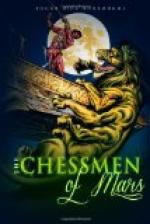“How do you know they have not these things?” asked the girl.
“There are no landing-stages upon the roofs—not one that can be seen from here; while were we looking similarly at Helium we would see hundreds. And they have no firearms because their defenses are all built to withstand the attack of spear and arrow, with spear and arrow. They are an ancient people.”
“If they are ancient perhaps they are friendly,” suggested the girl. “Did we not learn as children in the history of our planet that it was once peopled by a friendly, peace-loving race?”
“But I fear they are not as ancient as that,” replied Turan, laughing. “It has been long ages since the men of Barsoom loved peace.”
“My father loves peace,” returned the girl.
“And yet he is always at war,” said the man.
She laughed. “But he says he likes peace.”
“We all like peace,” he rejoined; “peace with honor; but our neighbors will not let us have it, and so we must fight.”
“And to fight well men must like to fight,” she added.
“And to like to fight they must know how to fight,” he said, “for no man likes to do the thing that he does not know how to do well.”
“Or that some other man can do better than he.”
“And so always there will be wars and men will fight,” he concluded, “for always the men with hot blood in their veins will practice the art of war.”
“We have settled a great question,” said the girl, smiling; “but our stomachs are still empty.”
“Your panthan is neglecting his duty,” replied Turan; “and how can he with the great reward always before his eyes!”
She did not guess in what literal a sense he spoke.
“I go forthwith,” he continued, “to wrest food and drink from the ancients.”
“No,” she cried, laying a hand upon his arm, “not yet. They would slay you or make you prisoner. You are a brave panthan and a mighty one, but you cannot overcome a city singlehanded.”
She smiled up into his face and her hand still lay upon his arm. He felt the thrill of hot blood coursing through his veins. He could have seized her in his arms and crushed her to him. There was only Ghek the kaldane there, but there was something stronger within him that restrained his hand. Who may define it—that inherent chivalry that renders certain men the natural protectors of women?
From their vantage point they saw a body of armed warriors ride forth from the gate, and winding along a well-beaten road pass from sight about the foot of the hill from which they watched. The men were red, like themselves, and they rode the small saddle thoats of the red race. Their trappings were barbaric and magnificent, and in their head-dress were many feathers as had been the custom of ancients. They were armed with swords and long spears and they rode almost naked, their bodies being painted in ochre and blue and white. There were, perhaps, a score of them in the party and as they galloped away on their tireless mounts they presented a picture at once savage and beautiful.




